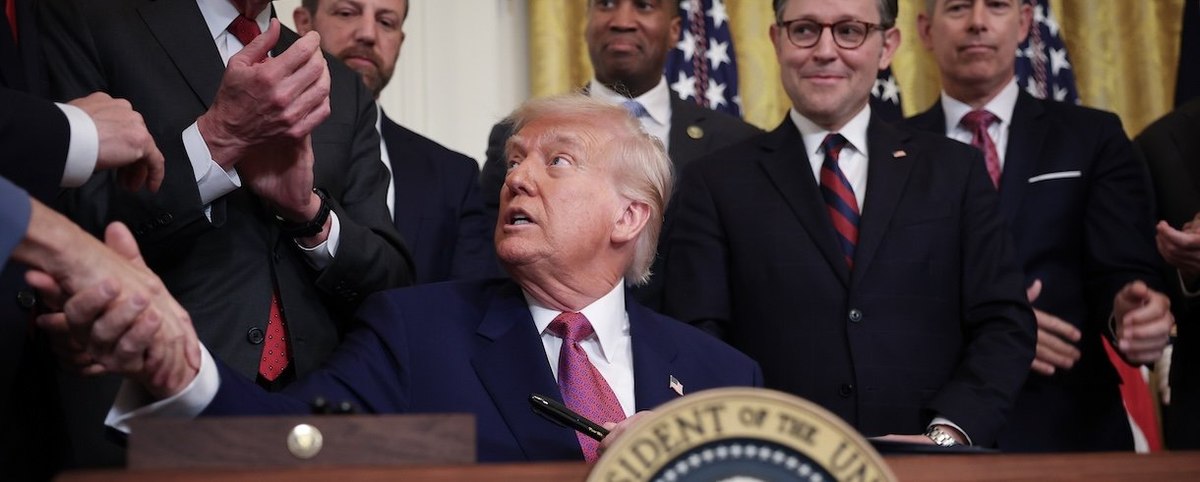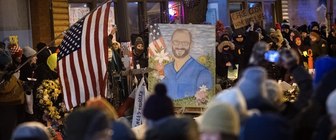A new YouGov survey finds that majorities of Americans feel the U.S. is in a constitutional crisis, believe the U.S. is much more politically divided than it was five years ago, and are concerned about white-supremacist extremism.
A majority (56%) of Americans agree that the U.S. is in a constitutional crisis. Democrats are much more likely than Republicans to agree with this statement (82% vs. 26%).
Only half (50%) of Americans agree the U.S. is a democracy. 28% disagree and 22% are not sure. Republicans are slightly more likely than Democrats to say the U.S. is a democracy (59% vs. 52%).
The partisan gap is much larger on whether the U.S. is a dictatorship: 24% of Americans, including 35% of Democrats and 7% of Republicans, agree it is.
In February 2025, less Americans (18%) thought the U.S. was a dictatorship and slightly more (56%) agreed it was a democracy.
Nearly half (44%) of Americans believe democracy is working very (13%) or somewhat (30%) well. Republicans are much more likely than Democrats to say democracy is working well (69% vs. 26%).
In February, more Americans (51%) felt democracy was working well. Only 4% of Democrats in June 2025 polling think democracy is working well, down from 11% who said this in February.
38% of Americans think it’s very or somewhat likely that within the next 10 years, the U.S. will no longer be a democracy. Similar proportions believe that there will be a total breakdown of law and order (40%), that there will be a civil war (40%), and that there will be a civil war between people who are Republicans and Democrats (40%).
45% think it’s likely that the U.S. will no longer be a global superpower in 10 years; just as many believe there will be a total economic collapse in the U.S.
Democrats are more likely than Republicans to say each of these eight dire scenarios is likely to happen in the next 10 years. The largest gaps: 59% of Democrats and 16% of Republicans say it’s likely the U.S. will no longer be a democracy. 51% of Democrats and 8% of Republicans say it’s likely the U.S. will become a fascist dictatorship.
Political division and change
Most Americans (58%) think the country has become much more politically divided in the last five years. Democrats are more likely than Republicans to say this (72% vs. 52%).
47% of Americans say the Democratic Party has become more liberal in the last few years. 79% of Republicans and 23% of Democrats think this. 30% of Americans think the Democratic Party has stayed about the same over the last few years and 9% think it has become less liberal.
49% of Americans — including 37% of Republicans and 69% of Democrats — think the Republican Party has become more conservative in the last few years. 27% of Americans think it’s stayed about the same and 11% think it has become less conservative.
What about Americans’ own political leanings? 53% think their own political views have stayed about the same over the last few years, while 20% think they’ve become more conservative and 18% think they’ve become more liberal. Republicans are more likely than Democrats to say they’ve become more conservative (41% vs. 3%); Democrats are more likely than Republicans to say they’ve become more liberal (38% vs. 3%).
Fear and extremism
Two-thirds (67%) of Americans are scared about the way things are going in the world today, including 29% who say they are very scared.
Democrats are far more likely now than they were in October 2024 to say they are very scared about how things are going in the world (47% now vs. 24% in October). Among Republicans, 35% said they were very scared in October 2024; 10% say they feel this way now.
Extremism is one possible cause for many Americans' fear about the way things are going in the world today. 60% of Americans are concerned about white-supremacist extremism, including 40% who say they are very concerned about it. Similar shares of Americans are very or somewhat concerned about Muslim extremism (57%), left-wing extremism (56%), and right-wing extremism (55%).
Majorities of Democrats say they are very or somewhat concerned about white-supremacist extremism (90%), right-wing extremism (81%), and Christian extremism (76%). Majorities of Republicans say they’re very or somewhat concerned about left-wing extremism (79%), Muslim extremism (75%), and racial-minority extremism (56%).
23% of Americans — including 44% of Democrats and 3% of Republicans — believe that right-wing extremists have committed more violent attacks in the U.S. since Sept. 11 than have left-wing extremists, Islamic extremists, lone wolves who aren’t affiliated with any particular group or ideology, or some other kind of attacker. Slightly fewer believe that lone wolves (19%), left-wing extremists (18%), or Islamic extremists (14%) have committed the greatest number of violent attacks in the U.S. since Sept. 11.
Protest
One in 10 Americans (10%) say there have been political rallies or protests in their local area that they’ve attended. Far more (47%) say there have been political rallies or protests in their area, but they haven’t attended them. 34% say there have not been any in their area. Democrats (22%) are more likely than Republicans (2%) to say they’ve attended a political rally or protest in their area.
45% of Americans approve of the No Kings protest that was held on June 14 to oppose the military parade and President Trump’s use of federal power; 41% disapprove. Democrats are more likely than Republicans to approve (79% vs. 13%).
6% of Americans say they participated in a No Kings protest. 8% say a family member did, 17% say they have a friend who did, and 15% say they have an acquaintance who did.
Most (59%) Americans say that as far as they know, people who participated in the No Kings protests were mostly peaceful. 16% think they were mostly violent. Among people who attended a protest themselves or had a family member or friend who did, 93% say that as far as they know, people who participated in the No Kings protests were mostly peaceful.
Related:
- Republicans are more likely than Democrats to be scared about the state of the world
- How Americans have reacted to Donald Trump's 2024 victory
- How Americans describe the Democratic and Republican parties
See the results for this YouGov survey
— Carl Bialik and Taylor Orth contributed to this article
Methodology: This article includes results from an online survey conducted June 16 - 18, 2025 among 1,111 U.S. adult citizens. Respondents were selected from YouGov’s opt-in panel to be representative of adult U.S. citizens. The sample was weighted according to gender, age, race, education, 2024 presidential vote, 2020 election turnout and presidential vote, baseline party identification, and current voter registration status. 2024 presidential vote, at time of weighting, was estimated to be 48% Harris and 50% Trump. Demographic weighting targets come from the 2019 American Community Survey. Baseline party identification is the respondent’s most recent answer given around November 8, 2024, and is weighted to the estimated distribution at that time (31% Democratic, 32% Republican). The margin of error for the overall sample is approximately 4%.
Image: Getty (Win McNamee / Staff)
What do you really think about President Trump, American politics in general, and everything else? Share your reality, join the YouGov panel, and get paid to share your thoughts. Sign up here.









